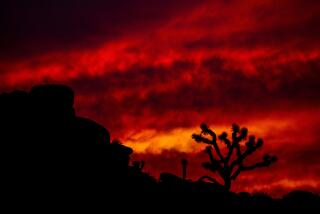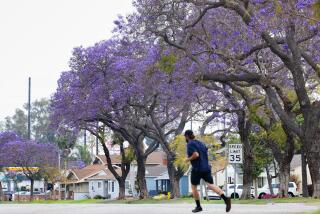Summer Needs More Winter
- Share via
Just how warm has this winter been? In the more than 70 years that fruit growers in the Visalia area have kept track, there’s never been one warmer. And that’s bad fruit news.
Certain crops, especially stone fruits--cherries, apricots, plums, peaches and nectarines--require a certain amount of cold weather, or chill hours, to produce the best results. And so far this year, they’re far short.
Chill hours are those that occur at or below 45 degrees during a tree’s dormancy--between the time the leaves fall and reemerge.
“Stone fruit trees typically require between 600 and 900 hours of chilling,” says Kevin Day, University of California Cooperative Extension farm advisor for deciduous fruits for Tulare County.
“This year we’ve gotten about 600 hours, right at the bottom edge of that. We have records going back to 1920, with a couple-year gap, and this is the lowest we’ve ever had. In an average year, we get 1,000 [hours].”
What does this mean? It’s too early to tell, but it could be another sparse year for summer fruit.
“We’ve had years that were as low as 750 chill hours and things were perfectly normal,” Day says. “On the other hand, last year we had almost 900 hours and we had symptoms of low chilling.
“What we do know is that when we have a low chilling year, we typically have a very long bloom period. Rather than five to 10 days, it could be two or three times longer. That’s a problem because whenever flowers are open, they’re subject to the whims of the weather and your potential for problems are greater.”
That’s what happened last year, when the long bloom period coincided with cold, damp spring weather to create a disastrous summer. Cherries were down 70% from normal, apricots were off 60%, plums fell 40% and even late-season fruits like peaches and nectarines declined 15% to 20%.
Curiously, that hasn’t happened this year. Rather than a protracted period of flowering, this early in the bloom it looks as if most trees are going through what growers call a “flash bloom”--when all the trees seem to blossom during the same short time.
“This is a double-edged sword,” Day says. “On the downside, the bees may not have enough time to visit all the flowers they need to--especially with fruits that require cross-pollination.
“The good news is that because of the shortened bloom, you’ve got less of a chance of having problems with fungal infections and other problems that come with a protracted bloom.”
So far, though, Day says growers might dodge the bullet this year. “Some species, particularly apricots, respond to lack of chilling by dropping fruit buds, and I have not yet seen that--though I’ve heard some reports of it. So far, all the trees I’ve seen for myself have all gone through the bloom very normally. But that doesn’t mean some of the higher chilling varieties that won’t bloom for another couple of weeks will do the same.”







